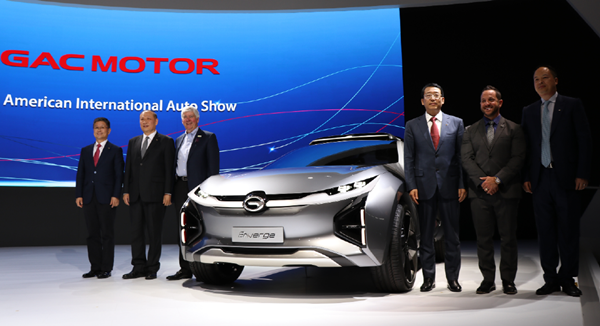China deepens auto ties in Michigan
China Daily USA | Updated: 2018-01-19 16:57
Industry recovery

From the depths of its downturn in 2009, the US auto industry has rebounded. After selling 10.4 million vehicles in 2009, sales reached 17.55 million in 2016, a record. That has led to a recovery that extends from the original equipment manufacturers (OEM) like Ford and GM to industry specific suppliers and even businesses that provide ancillary services.
But US sales by Detroit's Big 3 auto companies fell 2 percent to 17.2 million in 2017, according to Autodata Corp. It was their first year-over-year decline since 2009, ending an unprecedented seven-year expansion. Demand for new vehicles - especially SUVs - remains healthy as the new year begins.
At the Detroit Chinese Business Association's expo, companies lined up to offer their services to an industry that will be investing billions in things like autonomous or self-driving vehicles, electrification and connectivity.
William Pong is the general manager of Castle International Trade Co Ltd, a privately-owned company in Ningbo in Zhejiang province. It employs about 230 workers who manufacture casting, machining, forging and stamping parts, which are used in metallurgy, automobile, chemical and engineering industries.
"All of our parts are made for customer's specifications. We supply to America, Europe and Singapore. About 98 percent of our sales are exports with about 70 percent for the auto industry," he said.
Pong was not only looking for new customers but also potential partners to expand overseas. "We seek two types of partners - the first has a Tier 1 or Tier 2 plant. Second is an experienced sales agent or representative in the auto industry," he said.
Tier 1 refers to a direct supplier to OEMs; Tier 2 are key suppliers to Tier 1 companies.
Jimmy Hsiao is CEO of Quantum Compliance and Logic Solutions, an environmental, health and safety software company in Ann Arbor. He is a native of Taiwan who studied at the University of Michigan.
"We have a series of software products that we sell to manufacturers around the world including auto-related companies," he said.
Quantum software is used to help manage an auto plant's safety program and keep track of the handling of environmental waste. Quantum does business in North America and China and the company has 50 employees in Ann Arbor, 120 in the Chinese mainland and 25 in Taiwan.
Hsiao expects the US-China auto relationship to become closer. "I think the relationship will become even tighter. A lot of Chinese companies are now setting up operations in the US and that will continue," he said.
Hsiao is also the CEO of Logic Solutions in Ann Arbor, which will benefit from the shift to electric vehicles (EVs) and autonomous cars. "Both EVs and driver-less vehicles will need a lot of software for sensor systems and artificial intelligence. We can provide that software to auto companies," he said.
Nathan Graham is an attorney with Fragomen, a national law firm with an office in Troy, a Detroit suburb. Fragomen assists the Big 3 auto companies and their suppliers in getting overseas workers to become eligible to work in the US.
Graham said the industry recovery has spurred demand for engineers and software developers. "These people are in demand because the car of today is almost more computer than it is a machine," he said. "Our business with China has been steadily increasing over the last five years. We are seeing more Chinese engineers and developers who want to work in the US auto industry."
Graham said that the US industry is attractive right now. "The Chinese are intensely interested in making money. When the US industry is as strong as it is now, the Chinese are attracted to working here," he said.
























